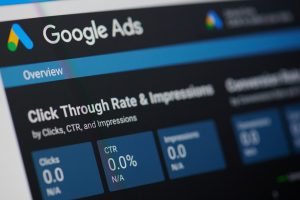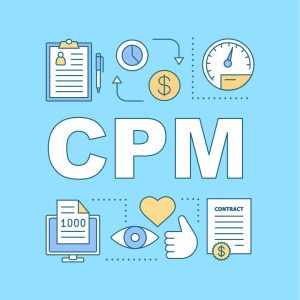Creating high-quality, targeted ads is an essential step to launching a successful Google Ads campaign. Equally important, however, is setting the right maximum cost-per-click (CPC) bid for your ads. Ad clicks can cost anywhere from 10 cents to $50. If you bid to too low, you’ll fail to attract clicks and generate traffic. If you bid too high, on the other hand, you may struggle to turn a profit.
Don’t Get Into Bidding Wars
The competitive nature of Google Ads often results in two or more advertisers continuously raising their bids in an attempt to achieve and maintain a top Ad Rank. Known as a bidding war, it’s a costly tactic that inflates click costs and drives down profits for advertisers.


If another advertiser’s ad is outranking your ad, keep your emotions in check to avoid getting into a bidding war. You can still raise your bids, but if the advertiser responds by raising his or her bids, back off and focus your attention elsewhere. The only winner in a bidding war on Google Ads is the search engine giant itself.
Set Bids at Keyword Level
Google Ads allows advertisers to set bids at the ad group or keyword level. Of those options, though, the latter is recommended. If you set bids at the ad group level, all your target keywords within the ad group will have the same bid by default. Competition varies between keywords, so you need to set bids manually to ensure you aren’t bidding too low or too high
Measure Competition Using the Keyword Planner Tool
To find out how much competition you can expect when bidding on a keyword, use the Keyword Planner tool. Available by clicking the “Tools” icon in the upper-right corner of your Google Ads account or by visiting ads.google.com/home/tools/keyword-planner, it offers performance metrics on keywords and related keywords. To use the Keyword Planner tool, select “Find New Keywords” and enter your target keyword. The tool will then populate and display a chart featuring several columns of data, two of which include the keyword’s average monthly search volume and its level of competition.
The Keyword Planner tool doesn’t reveal how many advertising are bidding on your keyword. Instead, it uses a “low,” “medium” or “high” label to represent competition. High-competition keywords usually attract more searches than low- and medium-competition keywords, but they also require higher bids to achieve a first-page Ad Rank.
Aim for the First Page
Even when bidding on short-tail, high-traffic keywords, aim for a first-page Ad Rank. Research shows first-page ads generate up to 90 percent more clicks than ads displayed on the second page of Google’s search results or deeper.
To find out approximately how much you need to bid for a first-page Ad Rank, click the “Keywords” tab in Google Ads, followed by the “Columns” icon and then “Modify columns.” Next, click the “Attributions” menu, followed by “Est. the first-page bid” and then “Apply.” When you return to the home screen of your Google Ads account, you’ll see a new column on the far right with first-page bid estimates for keywords in the corresponding row.
Bid Lower Than Your EPC
A good rule of thumb to follow when optimizing bids for any pay-per-click (PPC) marketing campaign, including Google Ads, is to bid lower for a keyword than the earnings per click (EPC) for that keyword.
To calculate a keyword’s EPC, add up the total revenue driven by a keyword — either historically or during a specific time frame — and divide this number by the total number of clicks the keyword generated during that same time. If a keyword generated 750 clicks and drove $950 last month, for instance, its EPC is $1.26. Unless a keyword’s performance declines, setting a bid lower than its EPC will turn a profit.
Consider Smart Bidding
Although it offers the greatest control over click costs, setting bids manually is time-consuming and exhaustive, especially when managing large campaigns with thousands of target keywords. Thankfully, Google Ads offers several automated bidding options, known as Smart Bidding, to streamline the bid management of large campaigns.
Smart Bidding options available on Google Ads include:
- Enhanced cost-per-click (ECPC): uses the probability of driving conversions to automatically adjust bids.
- Target CPA: adjusts bids based on your specified acquisition cost.
- Target return on ad spend (ROAS): uses machine learning to adjust bids based on how much net revenue you want the keyword or keywords to drive.
- Maximize conversions: lowers and raises bids automatically to maximize conversions while staying within your daily budget.
Use CPM Bidding for Branding on the Display Network Ads


CPM bidding is particularly useful when creating ads to strengthen your business’s brand because it charges you per 1,000 ad impressions. Regardless of how many users click your ad, you won’t be charged more than the maximum CPM bid set for the target keyword or URL for every 1,000 impressions your ad receives.
If you have $50 to spend, setting a CPM bid of $10 will expose your ad to 50,000 users. If you set a CPC bid of $1 and your keyword has a 25 percent click-through rate (CTR), only 200 users would see your ad.
It’s unlikely you’ll turn a profit from every target keyword on which you bid. Some keywords may become a black hole that drains your advertising budget while driving few or no conversions in return. But by setting bids with a strategic mindset, you’ll maximize your Google Ads earnings potential.
The Atlanta Small Business Network, from start-up to success, we are your go-to resource for small business news, information, resources.


While you’re here, don’t forget to subscribe to our email newsletter for all the latest business news know-how from Atlanta Small Business Network.
This has been a JBF Business Media production.






